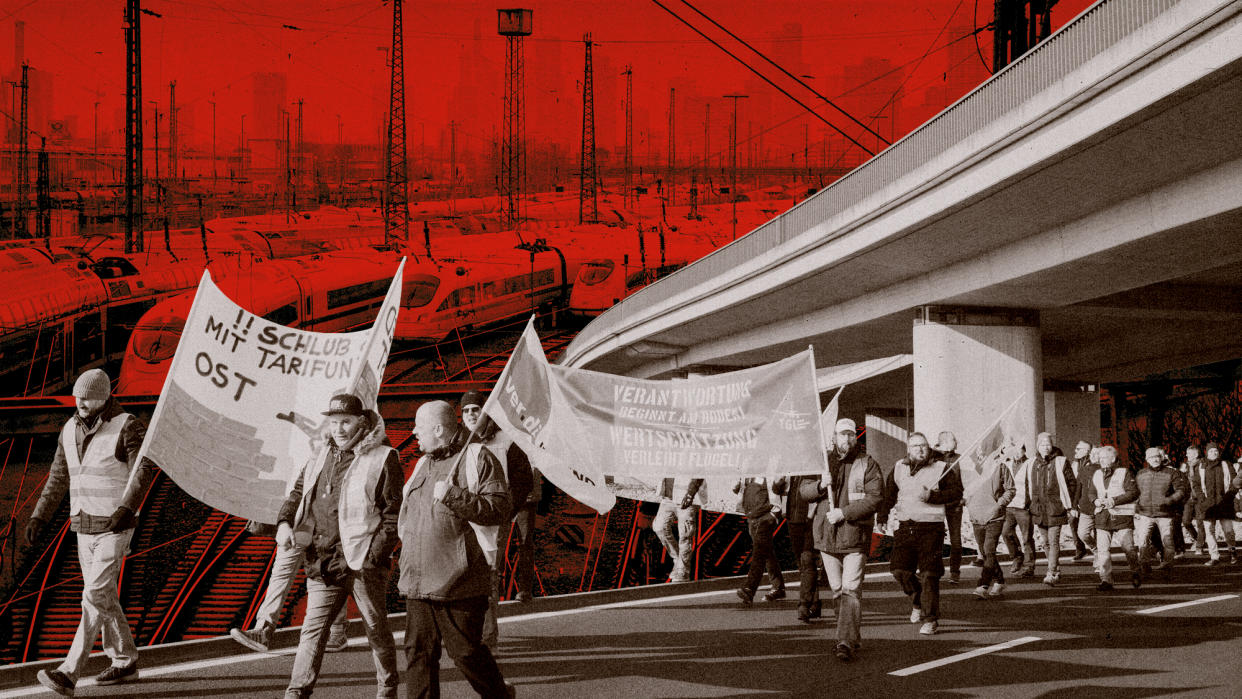Germany's transportation industry grinds to a halt as workers strike

Millions of people across Germany may have a tough time planning their next travel itinerary. The country's transportation industry was brought to a standstill Thursday as union workers staged a multi-day walkout. The strike saw employees of Germany's aviation and rail industry walk off the job, the latest in a series of labor disputes that have befallen countries across Europe.
The striking employees are union members from Germany's two largest transportation companies: Lufthansa, the country's national airline, and Deutsche Bahn, the German national railway company. The strikes are already having a major effect on the country's transportation infrastructure, and the workers have said they are planning to stay on strike through at least Saturday.
The dual walkouts are the beginning of a "so-called strike wave" across Germany, Claus Weselsky, the head of the train union, said to reporters. This also marks the second time in 2024 that the country's train workers have gone on strike, and their fifth in recent months. While many strikes have recently taken place across the EU, Germany's latest walkouts could prove to be the most consequential yet.
Why are Germany's transportation workers striking?
Both the rail and airline unions are demanding better wages and working conditions for their respective employees. GDL, the train union representing Deutsche Bahn, is seeking a "reduction in the working week for shift workers from 38 to 35 hours, with no change in payment to reflect the reduced hours," Deutsche Welle said. GDL had previously broken off negotiations with mediators after these demands fell apart.
Verdi, the union that represents about 25,000 Lufthansa employees, is "demanding a 12.5% pay raise or at least $545 more per month," DW said. It is also seeking an "inflation-compensation bonus" of about $3,200 with the possibility of additional bonuses.
Both Lufthansa and Deutsche Bahn have pushed back against the union's demands, with the latter refusing to concede its stake. GDL "doesn't budge a millimeter from its maximum position," Deutsche Bahn spokesperson Achim Stauss said to the BBC. Lufthansa's front office seemed to be a bit more receptive to the unions and has offered a 10% pay increase. However, Lufthansa employees in some cases "no longer even know how to make ends meet in Germany's most expensive cities," Verdi's chief negotiator, Marvin Reschinsky, said to the BBC, adding that the 10% increase was not enough.
How has this affected Germany?
The strikes led to millions of travelers having their plans upended as Germany's transportation systems were effectively stopped. This led to "traffic jams in cities and on highways, a shortage of share and rental cars, and plane passengers trying to desperately rebook flights to reach their destinations," The Associated Press said. The strikes caused chaos within the rail system, as "millions who usually rely on commuter trains found themselves stranded or stuck in traffic."
Deutsche Bahn officials said they were expecting "massive disruptions" through the end of the week, which would affect both regional services and long-distance trains. In all, about 80% of all long-distance trains in Germany were canceled, said Al Jazeera. Meanwhile, Lufthansa said in a statement that about 1,000 flights per day would be canceled for the duration of the strike, affecting about 200,000 airline passengers.
The effect of the strikes came down particularly hard on Frankfurt Airport, which serves as Germany's busiest airport and main international hub. The airport was closed for an entire day after Lufthansa security staff represented by Verdi walked off the job. The strikes will continue to "cause major disruptions and flight cancellations" throughout the coming days, the airport said on its Facebook page. Airports in Berlin and Hamburg were also affected by cancellations.
What is the endgame for the strikes?
The strikes come as Germany has been "troubled by industrial action for months as workers and management across numerous sectors wrestle over terms amid high inflation and weak business activity," AFP said. Beyond the transportation industry, strikes have also hit "supermarkets and the civil service, among other areas of public life."
As for the future of the transportation industry, mediators are attempting to hatch a deal between the unions and the companies. Additional action, particularly any future strikes, will be announced "when we think the time is right," Weselsky said to reporters.

